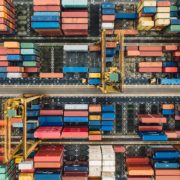A student was on his way home. Tired and exhausted he decided to take the first jeepney that passed by. He paid the exact amount of seven pesos and uttered “Bayad po.” The jeepney driver called him out and said that the student discount fare went up to eight pesos. The student insisted that seven pesos should be the fare with the student discount rate. They passed by a traffic officer and so the student asked: “How much is the fare?”
The enforcer said that it was only seven pesos. The student was proven right. But the jeepney driver had to pay a fine of P5,000 pesos for overcharging his passenger. For a rift over a one-peso fare difference, the jeepney driver sure did pay P5,001 more.
Instead of focusing on who is to blame in the said scenario, one must also take a look at the root cause of this commotion. Prices of goods and services are continuously increasing right before our eyes. Most of the time, such increase leaves us wide-eyed and shocked. People eat complaints about price surges for breakfast. And quite frankly, as expected, no one would dare say – it tastes good.
Now we could start to put the blame on something. And I have the most promising suspect. Let us take a look at inflation.
Inflation is defined as the movement of goods and services over a certain period of time.
The Philippine Statistics Authority (PSA) issues a series of data that shows the rate of inflation per month. PSA releases the data during the first week of each month. It issued the figures for August 18 and showed an inflation rate of 6.4 percent – a record-breaking high for the last nine years.
Inflation is normally measured by referring to the market basket. This market basket is the list of goods and services Filipinos consume regularly. Food and non-alcoholic beverages top the list considering that they are the most consumed commodity in an average Filipino home. Other commodities included in the said market basket are as follows – alcoholic beverages and tobacco, clothing and footwear, water, electricity, gas and other fuels, furniture, household equipment and maintenance, health, transport, communication, recreation and culture, education, restaurants and miscellaneous goods and services.
Before you bring out your torches and pitchforks, we must consider first the motive. Why did Philippine inflation rise to this level?
Inflation’s co-conspirators: Persons of interest
Our primary suspect has accomplices all over the world. The said price surge could be influenced by both local and international factors. More often than not, these factors drove inflation to an all-time high. Such factors include – global oil price hike, TRAIN law and agricultural product decrease.
Partners in Crime: Global Oil Price Hike and TRAIN Law
The Philippines has no known oil source so in order to fulfill its oil needs, the country imports from other nations. Although the global prices are controlled by several factors, the increase in prices of petroleum is still observed as continuous. Thus, significantly affecting the nation who owes most of its oil-related commodities to international resources.
There is a way to perceive this situation wherein Tax Reform for Acceleration and Inclusion (TRAIN) Law could be considered equally responsible. Republic Act No. 10963 provides automatic tax increase in products such as unleaded gasoline, diesel and kerosene until 2020. Well, if it still appears blurry, here is a clearer version of it.
⇮ GLOBAL OIL PRICE + ⇮ LOCAL TAX IMPOSITION = ⇮ OIL PRICE
Agricultural products continue to deplete
If I have a peso for every time I hear how the Philippines is agriculturally inept despite its abundance of natural resources, I might not know what to do with it. This just goes to show that although the Filipinos are aware of how agriculturally abundant their country is. However, this does not change the fact that there is a continuous decline in the supply of products from the different regions. Rice prices, for instance, is rising to the roofs in regions such as Bicol with 12.5 percent, SOCCSKSARGEN (South Cotabato, Cotabato, Sultan Kudarat, Sarangani and General Santos) with 12.4 percent and Ilocos Region with 11.7 percent.
Recent accounts reveal that the Philippines’ inflation rate is deemed the highest among members of the Association of Southeast Asian Nations (ASEAN).
Vietnam’s inflation rate (at least as of July) was only at 4.5%, Indonesia 3.2%, Thailand 1.5%, Malaysia 0.9%, and Singapore 0.6% as reported by Rappler. Such information is alarming since this is an aspect where the country should not fare better than everyone else. The higher the price of goods and services, the weaker the value of the Philippine peso. Thus, fewer commodities will be purchased with the same amount if such a trend continues.
Consumers: Accomplice or Victim?
Consumers are those most affected by the said inflation rise. They have to pay more for the same products they intend to purchase. Employees with a salary increase of little to none have to take the heavier blow in this scenario. Even those with bank investments are not to spare since there is also a decrease in monetary value. However, if you look at it closely, they could have contributed to the current inflation rate.
Suppose the news announces that there will be a price hike among Christmas related goods and services. Naturally, people would try to hoard these products just before the expected price hike. This will increase the demand rate that would in turn spike prices even further.
Is inflation inherently good?
Affirmative. Inflation is good for the economy. In fact, inflation is even welcomed as long as it falls within the targeted percentage and is demand driven. The target inflation rate for this year until 2020 is 2 to 4 percent. However, the current inflation rate went the other way as it increased beyond the acceptable range and is considered supply driven.
Authorities are still figuring out ways in order to put a halt in inflation’s mischiefs. It did not only inflict fear among us – especially to those who struggle to get by daily, it also impedes any economic growth possible for the country. The economic officials must do something about this before it’s too late. Because if they fail to do so, we might never be able to get more than what we paid for.






